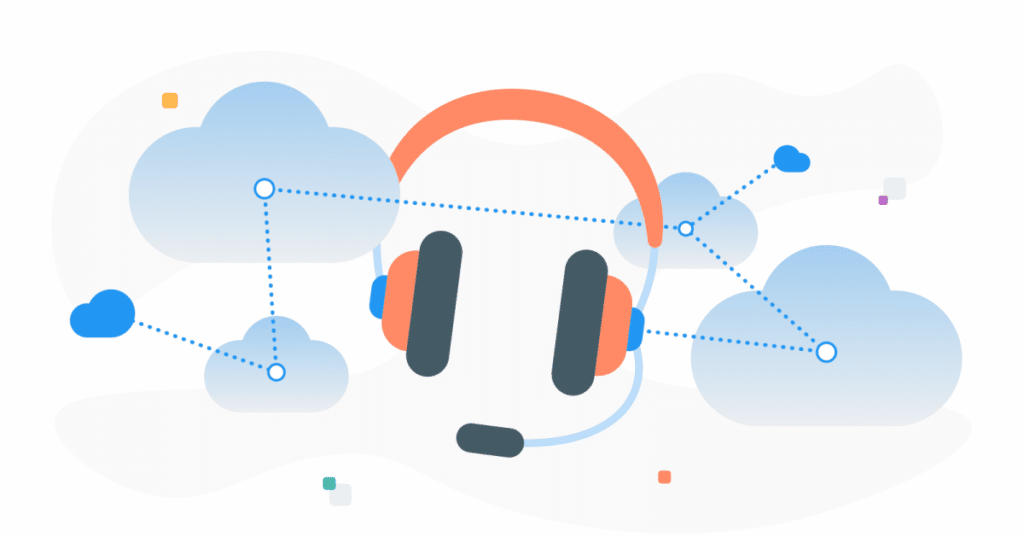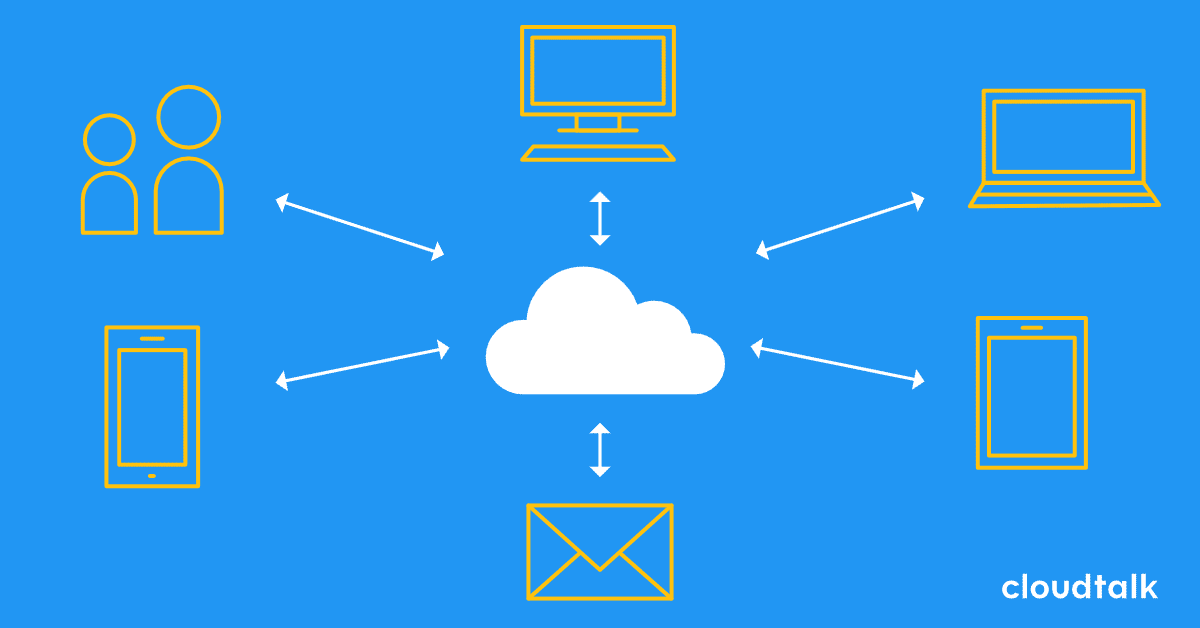
Can you improve your customer service, take some workload off your agents’ shoulders, and save money while doing so? Yes, you can, because cloud solutions can give you all of this and more. Read our article on 7 reasons why investing in a cloud call center is a great idea for operations of all sizes.
Despite the growing popularity of cloud services (can you imagine moving back to USB sticks rather than using Google Drive?), many call centers are still using a traditional on-premise phone infrastructure and call center platforms today.
But while the systems were doing their job well years ago, it’s hard for them now to keep up with the modern times and the new ways in which customers can communicate with businesses.
If you are using such a system in your call center, you have probably noticed that your regular system is only becoming increasingly limited and inefficient:
- maybe you can’t add other communication channels (like SMS, chat, or Facebook Messenger) to your app
- your employees have to perform many tasks manually
- updating the system on each of the office computers just takes far too much of your and your employees’ time
- scaling those systems is quite troublesome as well, as adding new features is eithertoo expensive and time-consuming or outright impossible
And as the problems with slow working or inefficient call center software get in the way of providing exceptional customer service, many companies are starting to consider moving their call centers from legacy systems to modern cloud center solutions. Gartner predicts that, by 2022, 90% of companies on the market will be using cloud services.
As those systems can provide much better scalability, efficiency, and flexibility while allowing companies to reduce call center maintenance costs, they are an ideal choice for businesses of all sizes and industries.
Are you also considering moving your business to the cloud, but aren’t sure if doing so will be worthwhile or are concerned about the security of your data? You are in the right place. In this article, we’ll go through 7 reasons why you should move your business to the cloud in 2026 and what benefits you can get out of it.
#1 Cloud center solutions are cheaper
When it comes to comparing regular call center systems with cloud centers, the most striking difference is costs. Setting up a traditional call center is expensive. Besides licenses for the call center platform, you also need to consider the costs of getting compatible phone sets for your:
- whole office
- necessary hardware
- the power supply
…plus hiring IT team services to install the system, update it, maintain the phone infrastructure, and occasionally fix issues. That not only takes a lot of time to set up, but everything has to be paid upfront as well.
With Cloud solutions the costs are much lower, as you don’t need a complex phone infrastructure in your building or a set of phones that are compatible with a given system. All you need is to pay for a cloud service subscription and eventually for a business router that can handle a large amount of traffic – that’s all.
There are no update or maintenance costs either, as the service providers handle those. Another area in which you can save a good chunk of your call center budget is international and overseas call costs, since the price of such calls when using VoIP is a fraction of what you would have to pay when using regular phone lines.
#2 Cloud systems are easier to install and update
When it comes to typical call centers, having a phone infrastructure ready in your office is only the beginning. Before your employees can start their job, an IT technician has to:
- install the call center software on every computer
- create the system accounts for each worker
- connect the phones and all additional equipment to the network.
…and that takes time, even if everything goes without a hitch. If you need to update the software, that has to be done on each computer separately.
Cloud solutions don’t cause that much hassle – as long as you have a fast internet connection in your office and devices that can access it, you are pretty much ready to start with cloud call centers. And as a cloud phone system doesn’t require a lengthy installation and setting up on each computer, there’s no need for IT technicians to help either.
#3 Cloud solutions can offer as good call quality as landline phones
In the early days of VoIP services, connections were pretty unreliable and the quality of the calls was poor. Companies therefore preferred to pick a typical PBX system that could guarantee them good call quality – after all, it’s necessary for a business to understand its callers and for them to be understood.
Nowadays, though, thanks to massive technological advancements in terms of internet speed, most cloud calling solutions offer HD quality so there’s no real difference between the quality of calls. While there still might be occasional connection problems, most cloud call center solutions have several tools built into them to prevent lags, echoes, and so called “choppy voice.”
In fact, modern cloud solutions can offer equally good call quality on international or overseas calls as on local ones, while the cost of such calls through the internet is much lower than with traditional phone lines.
#4 Cloud calling solutions are easily scalable
One of the key benefits of using cloud call center platforms is their scalability. Imagine that you need to add a new user to your call center software or switch your plan to a higher one. How much time (and paperwork) will that take? Enough that you might need to think about making those changes well in advance.
Cloud solutions are much more flexible, to the point that you can make changes to the system whenever you need to and “grow” the call center platform together with your company.
Let’s say you need more agents to handle calls during a busy holiday season – with cloud solutions, you can add more agents to the system and remove them later when they are no longer needed.
- Need a higher plan? You can upgrade your existing one in a matter of minutes.
- Additional phone numbers? They are available to use right after choosing them in your softphone app without extra costs. Even international ones.
- Moving to new devices? Just login to your cloud account and all of the tools and data will be there.
- You can also add or remove features as you like in order to make the cloud software work exactly the way you need.
#5 Cloud systems allow employees to work from anywhere
During the ongoing pandemic times, when the vast majority of businesses from all industries have been forced to move to remote working, one flaw of regular call centers has become especially visible. Namely, the phones and software used in standard call centers are usually tied to the office’s landline. This means they can only be used inside the building and only on devices that are connected to the office landline.
Meanwhile, cloud solutions provide the option of secure, reliable, and comfortable work from any place and any device, as long as there is stable internet access. Your employees can work from home and on their own laptop in the same way as they would from the office. They have access to the same tools and data, all they need to do is to login to their cloud account.
#6 Cloud solutions provide reliability and security
Worried that storing data in the cloud will mean your data will be at risk? Believe it or not, physical data centers have 51% more security incidents than cloud storage. Cloud platforms providers know that their reputation on the market depends on ensuring that companies’ data remain secure within the cloud, and so they offer numerous features to guarantee protection against:
- breaches
- leaks
- viruses
- hacker attacks
– from data encryption, private clouds, fraud prevention measures, and two-factor user authentication, for example. They also employ cybersecurity experts to improve security features and find any cloud security issues in the system before they can cause any damage. Also, you should consider using Cloud-Native Application Protection Platforms (CNAPP) to strengthen your cloud systems, giving extra safety against online threats.
Another benefit of cloud platforms is that almost all cloud platform providers nowadays offer disaster recovery features. If your call center hardware malfunctions or if there’s a power outage in the vicinity, usually that means all work is halted until the device is fixed or until the power is restored. With cloud tools, agents can simply switch to another device (even their mobile) to continue working. Aditionally, cloud infrastructure security ensures that sensitive data and operations remain protected, even during such disruptions.
#7 Cloud systems help your agents deliver exceptional customer support
Cloud systems also boost your agents’ efficiency and productivity thanks to the many features made available to them. An IVR menu and custom call flows can match callers with the most qualified agents for their questions or issues (which reduces the need for transferring a caller to another agent), while various automation features can save plenty of your agents’ time spent on doing their daily tasks manually.
For example, rather than dialling numbers manually and then waiting on hold or being sent to voicemail, those delays can be automatically handled by the platform and agents only connected only to callers who pick up the phone.
As agents’ efficiency and productivity grows, increasing customer satisfaction and trust becomes a piece of cake, as callers will appreciate a company that can handle their questions or issues quickly and efficiently.
Conclusion
Call centers saying goodbye to traditional landlines is only a matter of time. Those systems did their job well, but in today’s world their limitations start to weigh heavily.
To keep up with the times and not risk falling behind the competition, moving from on-premises platforms to cloud solutions is the best choice – especially the latter are far more flexible and less expensive than the former.
If you are looking for a cloud call center platform to start using in 2026, how about giving the CloudTalk team a call?
















